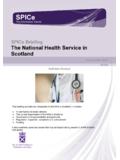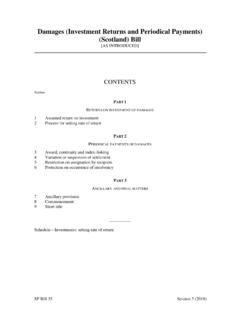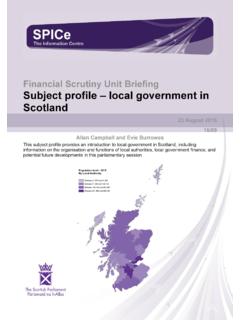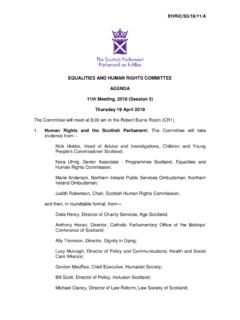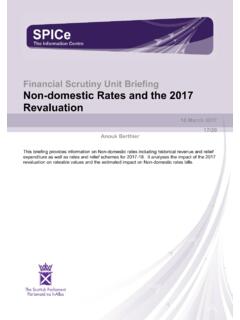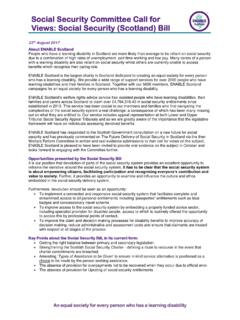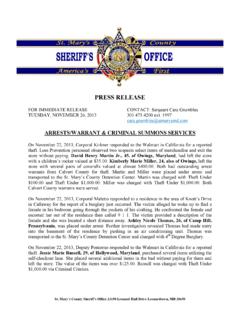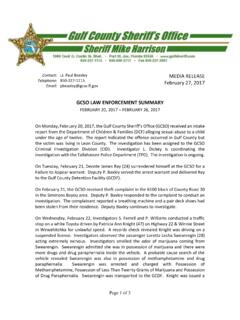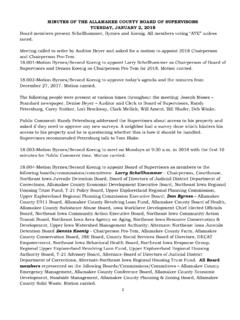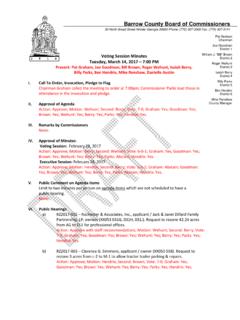Transcription of JUSTICE COMMITTEE AGENDA 12th Meeting, 2018 (Session 5 ...
1 J/S5/18/12/A JUSTICE COMMITTEE AGENDA 12th Meeting, 2018 (Session 5) tuesday 24 April 2018 The COMMITTEE will meet at am in the Mary Fairfax Somerville Room (CR2). 1. Declaration of interests: Jenny Gilruth will be invited to declare any relevant interests. 2. Decision on taking business in private: The COMMITTEE will decide whether to take item 6 in private. 3. Remand: The COMMITTEE will take evidence from Michael Matheson, Cabinet Secretary for JUSTICE , Philip Lamont, Criminal JUSTICE Division, and Kerry Morgan, Community JUSTICE Division, Scottish Government. 4. Management of Offenders (Scotland) Bill: The COMMITTEE will take evidence on the Bill at Stage 1 from Neil Devlin, Bill Team Leader, Community JUSTICE Division, Nigel Graham, Policy Adviser, Criminal JUSTICE Division, and Craig McGuffie, Principal Legal Officer, Directorate for Legal Services, Scottish Government.
2 5. JUSTICE Sub- COMMITTEE on Policing: The COMMITTEE will consider a report back from the Sub- COMMITTEE meeting on 19 April 2018. 6. Management of Offenders (Scotland) Bill: The COMMITTEE will consider witnesses for its scrutiny of the Bill at Stage 1. J/S5/18/12/A Peter McGrath Clerk to the JUSTICE COMMITTEE Room The Scottish Parliament Edinburgh Tel: 0131 348 5195 Email: The papers for this meeting are as follows AGENDA item 3 Paper by the clerk - remand J/S5/18/12/1 Private paper - remand J/S5/18/12/2 (P) Evidence received on the use of remand in Scotland AGENDA item 4 Paper by the clerk - Management of Offenders (Scotland) Bill J/S5/18/12/3 SPICe Briefing - Management of Offenders (Scotland) Bill J/S5/18/12/4 Private paper 1 - Management of Offenders (Scotland) Bill J/S5/18/12/5 (P) Management of Offenders (Scotland) Bill and accompanying documents Written submissions received on the Bill AGENDA item 5 Paper by the clerk - JUSTICE Sub- COMMITTEE on Policing J/S5/18/12/6 AGENDA item 6 Private paper 2 - Management of Offenders (Scotland) Bill J/S5/18/12/7 (P) J/S5/18/12/1 1 JUSTICE COMMITTEE 12th Meeting, 2018 (Session 5), tuesday 24 April 2018 Remand Note by the clerk Introduction 1.
3 At its meeting on 19 December 2017, the COMMITTEE agreed to hold a round-table evidence session on remand, in order to explore issues around the use of remand in Scotland as well as the experience of prisoners held on remand. The round-table evidence session took place on 16 January 2018. The COMMITTEE heard from the Crown Office and Procurator Fiscal Service, HM Chief Inspector of Prisons for Scotland, the Scottish Prison Service, and the Scottish Working Group on Women s Offending. 2. After that session, the COMMITTEE agreed to do further work on remand. JUSTICE COMMITTEE consideration 3. At its meeting on 6 February, the COMMITTEE heard from Community JUSTICE Scotland, the Convention of Scottish Local Authorities (COSLA), Safeguarding Communities Reducing Offending (Sacro), and Social Work Scotland. This evidence session explored issues around the reasons for remanding a person into custody; the information available to the court to inform its decision on remand; and the availability of alternatives to remand, such as bail supervision, across Scotland.
4 4. At its meeting on 13 March, the COMMITTEE took evidence from Sheriff Gordon Liddle, President of the Sheriffs Association, and then from the Edinburgh Bar Association, the Law Society of Scotland, and Professor Neil Hutton from the University of Strathclyde. These evidence sessions focused on the decision-making process around bail and remand, as well as the availability of data on the reasons for individuals not being granted bail. 5. At its meeting on 20 March, the COMMITTEE took further evidence from the Scottish Prison Service, alongside representatives of East Ayrshire Advocacy Service (working at HMP Kilmarnock), Families Outside, and CrossReach who manage the family visitor centre at HMP YOI Polmont. The focus of the session was on the experiences of prisoners held on remand. 6. At its meeting on 27 March, the COMMITTEE heard from Apex Scotland, Circle Scotland, Shine, Tayside Council on Alcohol and Turning Point Scotland.
5 The focus of the session was the role of third sector in providing and supporting alternatives to remand, the availability and benefits of alternatives to remand, and existing examples of good practice. 7. All written submissions received to date can be found on the COMMITTEE s remand webpage. J/S5/18/12/1 2 8. On 17 April, the COMMITTEE visited Circle to learn more about the work they undertake with prisoners and those on remand in custody. 9. At its meeting on 24 April, the COMMITTEE will hear from the Cabinet Secretary for JUSTICE and Scottish Government officials. The COMMITTEE intends to agree its report on remand in May. J/S5/18/12/3 1 JUSTICE COMMITTEE 12th Meeting, 2018 (Session 5), tuesday 24 April 2018 Management of Offenders (Scotland) Bill Note by the clerk Introduction 1. The Management of Offenders (Scotland) Bill was introduced on 22 February 2018. It is a Scottish Government Bill.
6 The Bill makes provision in three discrete areas, linked by a common theme of the management of offenders: electronic monitoring of offenders: drawing together various legal provisions on monitoring into a single source and making some updates to the law; disclosure of convictions: making substantial amendment to the Rehabilitation of Offenders Act 1974, the general approach being to ease the requirement to disclose convictions (for instance by, in general, shortening the period during which a prior conviction must be disclosed) Parole Board for Scotland: a small number of reforms concerning the membership and administration of the Board. 2. The COMMITTEE will be taking evidence on the Bill throughout April and May and intends to report to Parliament on the general principles of the Bill by the end of June. The Stage 1 debate is likely to take place in the Chamber in mid-September.
7 Should the Parliament agree to the general principles of the Bill at Stage 1, the COMMITTEE is likely to consider amendments to the Bill at Stage 2 later in the autumn. 3. The first set of witnesses the COMMITTEE will be hearing from, on 24 April, are the Scottish Government Bill Team; the group of officials responsible for assisting the Cabinet Secretary for JUSTICE in formulating the policy and drafting of the Bill and in steering it through the Parliamentary process. During this session, the COMMITTEE is likely to focus its questioning on what the Bill does, and on why particular drafting or policy approaches were chosen. 4. Further witnesses on the Bill have yet to be decided but will be notified on future COMMITTEE agendas. They are likely to include professionals working in the criminal JUSTICE sector, third sector organisations and charities working with victims and offenders, and academic experts, as well as the Cabinet Secretary for JUSTICE .
8 J/S5/18/12/4 1 JUSTICE COMMITTEE 12th Meeting, 2018 (Session 5), tuesday 24 April 2018 Management of Offenders (Scotland) Bill Introduction The Scottish Government introduced the Management of Offenders (Scotland) Bill in the Parliament on 22 February The policy memorandum states that it:2 brings forward a number of reforms designed to deliver on the Scottish Government s commitment to continue to transform the way in which Scotland deals with offenders, ensuring that Scotland s JUSTICE retains its focus on prevention and rehabilitation, whilst enhancing support for victims . (para 4) It seeks to make changes in relation to: the electronic monitoring of offenders in the community extending the potential for monitoring; both in terms of what other measures it can be combined with and the use of new technologies the disclosure of convictions reducing the length of time most people with convictions have to disclose them (eg when applying for work) and extending the range of sentences covered by rules limiting the need to disclose the Parole Board for Scotland various reforms relating to the composition, appointment, functions and governance of the Parole Board Electronic Monitoring Background The use of electronic monitoring within the Scottish criminal JUSTICE system was first piloted in 1998.
9 Following this, in 2002, it became available nationally in the form of Restriction of Liberty Orders (RLOs) a type of community sentence in which the 1 Management of Offenders (Scotland) Bill [as introduced] Session 5 (2018). SP Bill 27. Edinburgh: Scottish Parliament. (2018). Retrieved from (Scotland)%20 2 Management of Offenders (Scotland) Bill: Policy Memorandum Session 5 (2018). SP Bill 27-PM. Edinburgh: Scottish Parliament. (2018). Retrieved from (Scotland)%20 J/S5/18/12/4 2 movements of the individual are subject to restrictions (normally by means of a curfew). In addition to RLOs, electronic monitoring is now used to monitor restrictions on movement imposed in connection with a number of other community sentences: restrictions imposed as part of Drug Treatment and Testing Orders (DTTOs) restrictions imposed for breach of Community Payback Orders (CPOs)3 Electronic monitoring is also used to monitor compliance with restrictions on movement forming part of relevant conditions of release from custodial sentences: where a prisoner serves part of a custodial sentence in the community under Home Detention Curfew (HDC) licence conditions as a possible licence condition imposed by the Parole Board for Scotland where it grants early release from a custodial sentence The policy memorandum, published along with the Bill, notes that.
10 Whether used in the context of either a community sentence or as a licence condition, electronic monitoring is still largely used as a standalone measure to enforce a home confinement curfew, typically of 12 hours between 7pm and 7am . (para 12) Electronic monitoring in Scotland is currently limited to the use of radio frequency technology. This employs a base unit along with an electronic tag on the individual s ankle. It is normally used to monitor compliance with a curfew. The base unit is installed at the address where the individual must stay during the curfew (as detailed in the order). Radio frequency technology can also be used to monitor compliance with an order excluding a person from somewhere (eg from entering a particular address). The need to install base units covering the excluded area(s) imposes practical limits on wider exclusion zones. The electronic monitoring service is currently provided by the private company G4S, under contract to the Scottish Government.

